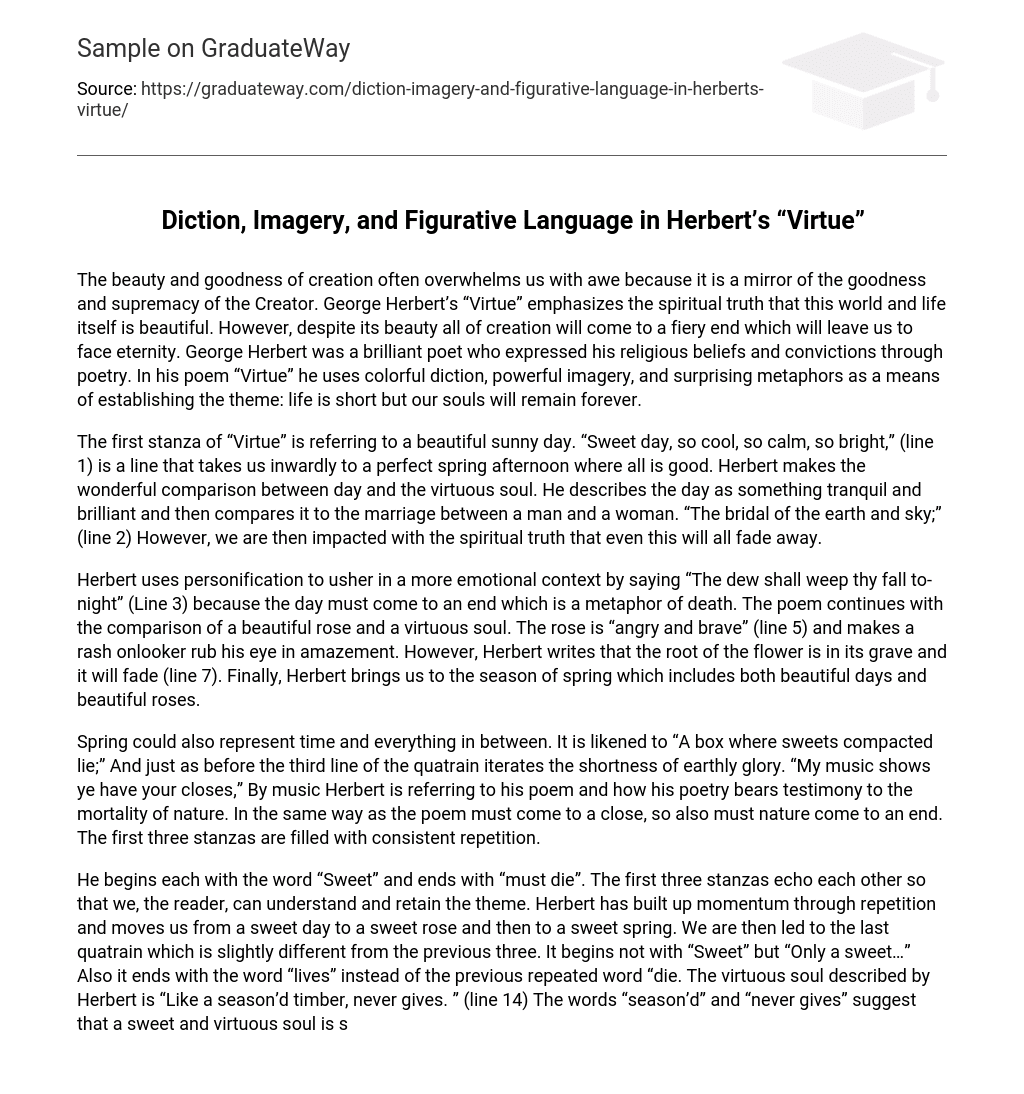The beauty and goodness of creation often overwhelms us with awe because it is a mirror of the goodness and supremacy of the Creator. George Herbert’s “Virtue” emphasizes the spiritual truth that this world and life itself is beautiful. However, despite its beauty all of creation will come to a fiery end which will leave us to face eternity. George Herbert was a brilliant poet who expressed his religious beliefs and convictions through poetry. In his poem “Virtue” he uses colorful diction, powerful imagery, and surprising metaphors as a means of establishing the theme: life is short but our souls will remain forever.
The first stanza of “Virtue” is referring to a beautiful sunny day. “Sweet day, so cool, so calm, so bright,” (line 1) is a line that takes us inwardly to a perfect spring afternoon where all is good. Herbert makes the wonderful comparison between day and the virtuous soul. He describes the day as something tranquil and brilliant and then compares it to the marriage between a man and a woman. “The bridal of the earth and sky;” (line 2) However, we are then impacted with the spiritual truth that even this will all fade away.
Herbert uses personification to usher in a more emotional context by saying “The dew shall weep thy fall to-night” (Line 3) because the day must come to an end which is a metaphor of death. The poem continues with the comparison of a beautiful rose and a virtuous soul. The rose is “angry and brave” (line 5) and makes a rash onlooker rub his eye in amazement. However, Herbert writes that the root of the flower is in its grave and it will fade (line 7). Finally, Herbert brings us to the season of spring which includes both beautiful days and beautiful roses.
Spring could also represent time and everything in between. It is likened to “A box where sweets compacted lie;” And just as before the third line of the quatrain iterates the shortness of earthly glory. “My music shows ye have your closes,” By music Herbert is referring to his poem and how his poetry bears testimony to the mortality of nature. In the same way as the poem must come to a close, so also must nature come to an end. The first three stanzas are filled with consistent repetition.
He begins each with the word “Sweet” and ends with “must die”. The first three stanzas echo each other so that we, the reader, can understand and retain the theme. Herbert has built up momentum through repetition and moves us from a sweet day to a sweet rose and then to a sweet spring. We are then led to the last quatrain which is slightly different from the previous three. It begins not with “Sweet” but “Only a sweet…” Also it ends with the word “lives” instead of the previous repeated word “die. The virtuous soul described by Herbert is “Like a season’d timber, never gives. ” (line 14) The words “season’d” and “never gives” suggest that a sweet and virtuous soul is strong and able to endure. The imagery used in line 15 “whole world turn to coal” is referring to Scriptures that contain prophetic and apocalyptic messages foretelling how the world will all be burned. However, even though the whole world and everything in it shall be burned, the virtuous souls will then chiefly lives.
George Herbert’s imagery and diction in “Virtue” presents the reality that all the beauty of this earthly realm is temporary and only a life obedient to God will satisfy the gap of eternity. Based upon George Herbert’s life, I believe that he was a man who had disregarded the pleasures and lusts of the world in order to find a satisfying, sacred life. “Virtue” is a poetic reminder that earthly glory is simply a picture of God’s glory. Furthermore, we should not put our hope in creation, for it will all be burned like coal. The only thing that will last the fire is a sweet and virtuous soul.





